Know Thyself
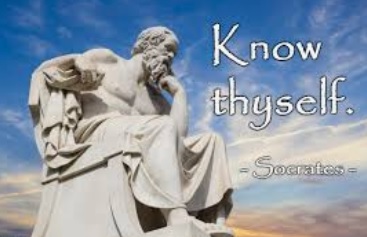
Socrates said the same thing, “Know yourself!”
St. Catherine of Genoa (1447–1510) said, “My deepest me is God!” With divine accompaniment, we will literally “find our souls” and the One who lovingly dwells there. (Rohr)
Wisdom teaches that the emotions (in the heart) are in fact the primary culprits that obscure and confuse being in touch. The real mark of personal authenticity is not how intensely we can express our feelings but how honestly we can look at where they’re coming from and spot the elements of clinging, manipulation, and personal agendas that make up so much of what we experience as our emotional life today. (Rohr)
Those who have gone to their depths uncover an indwelling Presence. Christian theology names this inner Presence as the Holy Spirit, which is precisely God as immanent, within, and even our deepest and truest self. Nothing shows the presence of the spirit in human life as well as love does. The Holy Spirit is given equally to all; but it must be received, too. (Rohr)
Know Our False Self thru Our Shadows:
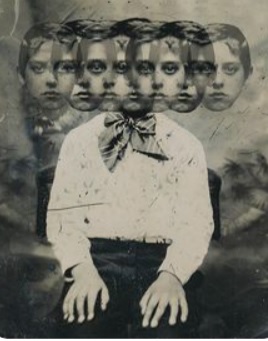
Teresa of Ávila said that the mansion of true self-knowledge was the necessary first mansion on the spiritual journey. Once we have faced our own hidden or denied self, there is not much to be anxious about anymore, because there is no fear of exposure. We are no longer afraid to be seen—by ourselves or others. The game is over—and we are free. We finally are who we are, and can be who we are, without disguise or fear. (Rohr)
As we become aware of the shadow side of our personality and how much energy we put into programs for security, power and affection, esteem and approval, we realize that we cannot manage our own lives.self-knowledge that has grown to include parts of our personality that we didn’t know because often we had projected the shadow side of our personality onto someone else. Now we are confronted with who we actually are with all our brokenness and our weakness.(Rohr)
The three powers that typically hold humans in bondage: ego, possession, and violence. (Rohr,7/16/20)
The ego wants to eliminate all humiliating or negative information in order to “look good” at all costs. Jesus calls this self a hypocrite. We try to hide or deny this shadow, most especially from ourselves. We absolutely need conflicts, moral failures, defeats to our grandiosity, even seeming enemies. These are necessary mirrors, or we will have no way to ever spot our shadow self. Jesus taught that if we see rightly, our actions and behaviors will eventually take care of themselves. The God of the Bible is best known for transmuting and transforming our shadow selves into our own more perfect good. (Rohr)
People of deep faith develop a high tolerance for ambiguity and come to recognize that it is only the small self that needs certitude or perfect order all the time. (Rohr)
'Negative emotions' don’t cease to exist because we ignore them. They just find other ways to express themselves. The Shadow is the place where everything we have forgotten, denied, rejected, or not yet discovered goes to live. We cannot simply remove the shadow all at once. It takes wisdom, courage, and forbearance for our shadows to reveal themselves to us so they can be faced and dealt with gently, compassionately, and firmly.(Rohr)
Don’t hide from our shadow self but advertises it. So much of our religion has taught us to deny or hide our shadow, which forces us into a fatal split from foundational reality. (Rohr)
Fear: of alone, talking in group, expressing my opinion
Bias/judgmental: minorities, heavy/ugly people, losers, opposing political supporters
Compulsions/desires/attachments: eating, drinking, sex, addictions. Spiritually, addiction is a deep-seated form of idolatry. The objects of our addictions become our false gods. These are what we worship, what we attend to, where we give our time and energy, instead of love. Addiction, then, displaces and supplants God’s love as the source and object of our deepest true desire. We try to fulfill our longing for God through objects of attachment. God wants to provide our ultimate security, but we seek our safety in power and possessions and then find we must continually worry about them. (Rohr)
Pride: of intellience/education, accomplishments
Vanity: of looks, over-weight
Incompassionate/insensitive:
Uncertain:
Dullness/unattentive: of socialability, of awareness, of details, of hearing
Unsocialable: with acquainces
Bad habits: poor higene, procastination
Dependent/Neediness/attachment: on family and friends, money/security
Illusions/False Identifications:
Lazy: lack of service, church attendence, superficial work/jobs
Guilty:
Cheap:
Discontent:
Self-centered:
Defensive:
Impatience:
Tolerance:
Suffering avoidance:
Anxiousness: when things are undone, incomplete, cluttered
Insecure/needs approval:
Not integrity:
Not courageous:
Disrespectful:
Closed/un-receptive
Envy/resentment: those who are smarter, more athletic
Resistant to change:
Dualistic:
Two faced/backbiting:
Insincere:
Negativity:
Know Our True Self thru Meditation / Contemplation:

Jung wanted people to recognize those numinous voices already in our deepest depths. Without deep contact with one's in-depth self, Jung believed one could not know God. Jung taught was that the human psyche is the mediation point for God. If God wants to speak to us, God usually speaks in words that first feel like our own thoughts. Sometimes our thoughts are God’s thoughts. Contemplation helps train such awareness in us. The dualistic or non-contemplative mind cannot imagine how both could be true at the same time. The contemplative mind sees things in wholes and not in divided parts. We all must find an inner authority that we can trust that is bigger than our own. This way, we know it’s not only us thinking these thoughts. (Rohr)
The small self takes one side or the other in order to feel secure. It frames reality in a binary way. The small self is still objectively in union with God, it just does not know it, enjoy it, or draw upon it. Jesus asked, “Is it not written in your own law, ‘You are gods’?” (John 10:34). But for most of us, this objective divine image has not yet become the subjective likeness (Genesis 1:26‒27). Our life’s goal is to illustrate both the image and the likeness of God by living in conscious loving union with God. It is a moment by moment choice and surrender. (Rohr,9/3/20)
The unexamined life is not worth living. (Socrates)
"Know thyself!" also has self-help appeal. Is your aim to accept yourself? Well, you need to know thyself for that first. Or is it to make good decisions—decisions that are right for you? Again, this would be difficult unless you know thyself. (www.psychologytoday.com/us/blog/psychology-tomorrow/201802/know-thyself-is-not-just-silly-advice)
Examine yourselves as to whether you are in the faith, Do you not know yourselves, that Jesus Christ is in you? (2 Cor 13:5)
The ability to self-criticize and own our shadow side is a clear sign of health and interior freedom.6,p51
Give God time and God will give you eternity. Three points in the mediation that will hopefully help us to come to a greater awareness of our gifts as children of God. (faithmag.com):
1. We are a dwelling place of God. God is not just on the outside. God is within us! Read one or more of the following Scripture passages: 1 Kings 8:9-13; Luke 1:35-55; 1 Corinthians 3:16; John 14:15-24.
2. We have been given gifts from the Holy Spirit who empowers us. To think about your gifts, read 1 Corinthians 12.
3. Realizing our weakness has a good effect – it often humiliated us, and so curbs our pride. For the sake of Christ; for when I am weak, then I am strong.” (2 Corinthians 12:9-10)
By knowing our 'true' self - see Know the Treasure Within
Know Thru Enneagram:
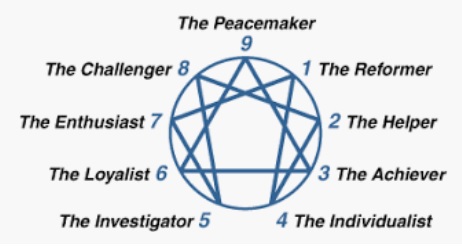
I think I am a number 9 (Peacemaker) on the Enneagram or possibly a 2 (Helper)
Know Thru Myers-Biggs Type Indicator:

The Myers–Briggs Type Indicator is an introspective self-report questionnaire indicating differing psychological preferences in how people perceive the world and make decisions. The test attempts to assign four categories: introversion or extraversion, sensing or intuition, thinking or feeling, judging or perceiving
I am a type INTJ (Introvert 47%, iNtuitive 16%, Thinking 9%, Judging 28%)
The first dichotomy is called your Attitude, and according to the MBTI, you're either an E for Extravert or an I for Introvert. Extraverts prefer action, frequent interaction, focus outward, and are most relaxed when interacting with others. Introverts prefer thought, less frequent but more substantial interaction, and are most relaxed spending time alone.
The second dichotomy is your Perceiving function, and you're either S for Sensing or N for Intuition. Sensing is the scientific, tangible data-driven approach to gathering information, preferring to deal in concrete, measurable information. The Intuition approach prefers theoretical, abstract, hunch-driven information, finding more meaning in apparent patterns and context.
The third dichotomy is your Judging function, and you're either a T for Thinking or an F for Feeling. This is basically how you make decisions. Thinking makes the logical decision, what's best for the situation, based on rules and pragmatism. Feeling decides based on empathy for the people whom the decision affects, seeking balance and harmony.
The fourth and final dichotomy is your Lifestyle, and you're either a J for Judgment or a P for Perception. This one gets a little confusing. Judgment types prefer to use the third dichotomy, Judging, when relating to the outside world, while Perception types prefer the second Perceiving dichotomy; but how that preference is determined is based on whether you're an Introvert or an Extravert. Suffice it to say, for the purpose of this light overview, that this last of the four dichotomies, Lifestyle, is the most complicated; and it's where Myers and Briggs most creatively expanded upon Jung on their own.
Know Thru St Ignatius Examen:
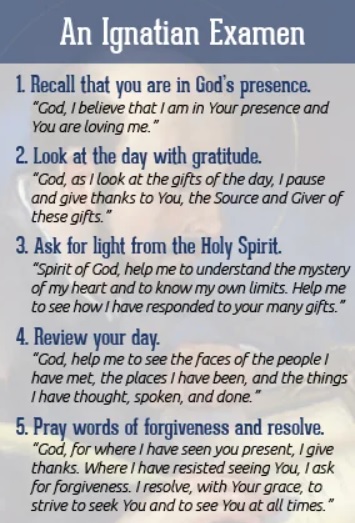
The Daily Examen is a technique of prayerful reflection on the events of the day in order to detect God’s presence and discern his direction for us.
This is a version of the five-step Daily Examen that St. Ignatius practiced.
1. Become aware of God’s presence.
2. Review the day with gratitude.
3. Pay attention to your emotions.
4. Choose one feature of the day and pray from it.
5. Look toward tomorrow.
Know Thru the Saints:
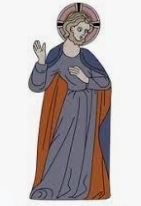
St Teresa of Avila declared self-knowledge to be the first and necessary entrace way to the Interior Castle.6,p13
The closer we get to the Light, the more of our shadow we see. Thus, truly holy people are always humble people. (Rohr,6/14/21)
Know the Treasure Within
Candle of Life
Something you can't hide says you're lonely
Hidden deep inside of you only
It's there for you to see, take a look and be
Burn slowly, the candle of life
Something there outside says we're only
In the hands of time, falling slowly
It's there for us to know WITH LOVE that we can go
Burn slowly, the candle of life
So love everybody and make them your friends
Know The True Self within as Divine
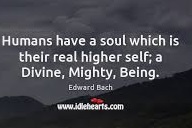
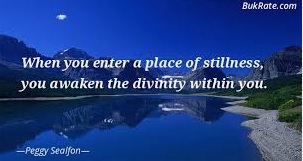
In the depths of our own souls, there is a great treasure waiting to be uncovered.11,p26
It is what in us is most like God, that 'likeness' can be heightened and transcended until it becomes Unity.11,p43
God cannot be found or grasped in the external world, but only in the inner world. If we seek him within, we shall find him everywhere. Having discovered God within, we can then discover him without.11,p51
To Know Thyself is to Know God
Created in the image and likeness
Once we are aware of that Word (Jesus/Christ) within ourselves, tune into it, live within it, then we can make sense of all the knowledge and experience that life in the world brings us, for we have the KEY to it all. The foundation cannot be found by looking outside ourselves, it can only be found by looking within, then we can look out at the world and sense it there too.11,p70
We have within us a spark of heavenly nature.11,p73
We are gods, yet we shall die like men.(Ps 82:6)
We are 'sons' in the 'Son' (p64, The Way of Paradox)
God became Man so that Man might become God.(Irenaeus and Athanasius)
If Christ is to be relevant to us, it is in this deepest and most inward part of ourselves that we must try to find him. A Christ who dwells here really is a treasure which no thief can steal, an unshakable rock on which to build our lives.11,p81
If we enter the Ground of the Soul, we shall encounter Christ, God the Son, and we shall become the Son ourselves; we shall share in the union which the Son has with the Father and the Spirit. The Incarnation will thus become a present reality for us, here and now, in our lives.11,p84
The paradox of Christ, the God-Man, is also our own paradox.11,p86
What if we get out of our heads (outside world) and listened to our hearts and guts (inside world) for important answers?(Zenempowrment)
We are not just humans having a God experience. The Eucharist tells us that, in some mysterious way, we are an ingested God having a human experience! Eat in such a way that the Holy Spirit becomes an energy within you and then the piece of bread that Jesus gives to you will stop being an idea, a notion.(Rohr)
God from the outside through the world, when it is the exact opposite [is true], standing within the heart of God and looking out.11,p65
Once we come into contact with the Holy Spirit, our Inner Source, we become living icons of true, humble, and confident power. We no longer need to seek “power over” others, because we have discovered the “power within” and know it is a dignity shared with all of life. [1] This is ultimately what it means to be a well-grounded person. the Holy Spirit is still the “lost” or undiscovered person of the Trinity. If we have not made contact with our true power, the Indwelling Spirit, we will seek power in all the wrong places.(Rohr)
Our soul is a hidden part of us, in union with divinity, is where our abundant goodness (our God-ness) exists. Jesuit paleontologist, Teilhard de Chardin [1881–1955], understood the necessity of opening the door inward to find and claim this goodness. Reflecting on his spiritual growth, Chardin observed this truth: "The deeper I descend into myself, the more I find God at the heart of my being."The full person God created us to be contains more than we can imagine, but most of us dwell within only a small portion of the superb castle of ourselves. Opening the door of our heart allows us entrance to the vast treasure of who we are and to the divine presence within us.(Rohr)
Paradoxically, immense humility, not arrogance, characterizes someone who lives in this True Self. You simultaneously know you are a child of God, but you also know that you didn’t earn it and you are not worthy of it. You know it’s entirely a gift (see Ephesians 2:8–9)(Rohr)
Teresa of Avila says "You know, you’re seeking union with God, which is a grace to desire this." And it is helpful to know, in the light of faith, that you and God are already one in the intimate and mysterious sense in which God is creating you as God’s self-donating love. God makes your very soul, that is, your very essence of who you are as a person created by God in the image and likeness of God, to be a relational mystery with God. That in your very soul, the very mystery of who you are and the very mystery of who God is are already intertwined. (Rohr)
Aging calls us to harvest our 'inner wisdom'. We are invited to a new way of being, to be a wise person in touch with the gifts of our soul. It is a time for inner growth and stage of spiritual development.(ePost 3/6/22)
We live our lives pursuing happiness and freedom “out there” as if it is a commodity. We have become slaves to our own desires and craving. This is Maya, illusion, the endless play of form. It is not wrong to desire to be awake, to be happy, but we must come to realize that it cannot be found outside of us.
The Holy Spirit within us is the desire inside all of us that wants to keep connecting, relating, and communing. It isn’t above us. It isn’t beyond us — it is within us. (Rohr)
For St Augustine says 'What does it avail me that Christ's birth is always happening, if it does not happen in me? That it happens in me is what matters.' God is above all a reality to be experienced from within. (p6, The Way of Paradox)
To find God in the deepest core of ourselves is done by detachment, by letting go of all in us that is not God, until a spark of awareness awakens in us, which Eckhart calls 'the Birth of God in the soul.' (p13, The Way of Paradox)
Love is not an emotion or obligation but is God present in the soul. When we love others with warmth, affection, and care for their needs, it is God loving them through us. (Rohr)